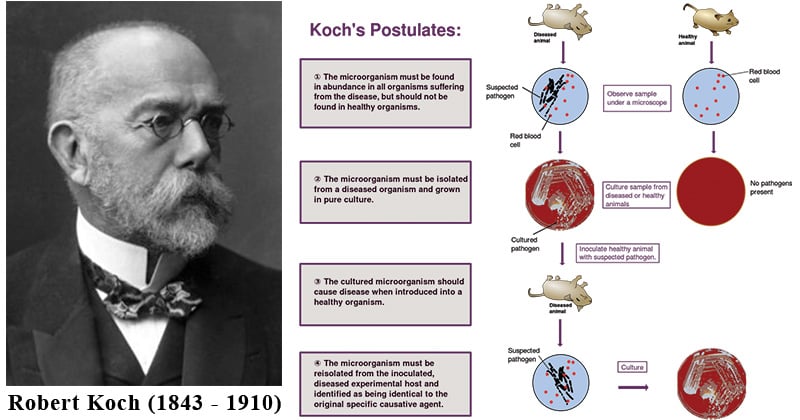- Heinrich Hermann Robert Koch (1843 – 1910) provided remarkable contributions to the field of microbiology. He was a German general practitioner and a famous microbiologist.
- He is credited to be one of the founders of the specific field of modern bacteriology.
- As the founder, he identified the specific causative agents of tuberculosis, cholera, and anthrax and gave experimental support for the concept of infectious disease, which included experiments on humans and animals.
- For this he is also regarded as a pioneer of public health, aiding legislation and changing prevailing attitudes about hygiene to prevent the spread of various infectious diseases.
- For his work on tuberculosis, he was awarded the Nobel Prize in 1905 in Physiology or Medicine.

Interesting Science Videos
Major Contributions of Robert Koch
- He investigated the anthrax disease cycle in 1876, and studied the bacteria that cause tuberculosis in 1882 and cholera in 1883.
- He discovered bacteria such as the anthrax bacilli, tubercle bacilli and cholera bacilli.
- Koch observed the phenomenon of acquired immunity.
- He introduced solid media for culture of bacteria. Koch pioneered the use of agar as a base for culture media. He developed the pour plate method and was the first to use solid culture media for culture of bacteria.
- Koch also developed media suitable for growing bacteria isolated from the body. Because of their similarity to body fluids, meat extracts and protein digests were used as nutrient sources. The result was the development of nutrient broth and nutrient agar media that are still in wide use today.
- He also introduced methods for isolation of bacteria in pure culture.
- He described hanging drop method for testing motility.
- He introduced staining techniques by using aniline dye.
- He invented the hot air oven and steam sterilizer, and also introduced methods to find out the efficacy of antiseptics.
- Koch’s Phenomenon: Robert Koch observed that guinea pigs already infected with tubercle bacilli developed a hypersensitivity reaction when injected with tubercle bacilli or its protein. Since then, this observation was called as Koch’s phenomenon.
- The medical applications of biotechnology still heavily depend on the Koch’s principles of affirming the causes of infectious diseases.
Contribution to the Germ theory
- Building on the early work of Louis Pasteur and the germ theory of disease, Robert Koch established the basic scientific requirements used to demonstrate that each specific disease is caused by a specific microorganism.
- The first direct demonstration of the role of bacteria in causing disease came from the study of anthrax by the German physician.
- These requirements were based on Koch’s experiments with anthrax isolated from diseased hosts, and are known as “Koch’s Postulates”.
The Experiment
In the experiment, Koch injected healthy mice with a material from diseased animals, and the mice became ill. After transferring anthrax by inoculation through a series of 20 mice, he incubated a piece of spleen containing the anthrax bacillus in beef serum. The bacilli grew, reproduced, and produced spores. When the isolated bacilli or spores were injected into mice, anthrax developed.
During Koch’s studies on bacterial diseases, it became necessary to isolate suspected bacterial pathogens. His criteria for proving the causal relationship between a microorganism and a specific disease are known as Koch’s postulates.
Koch’s Postulates
Koch’s Postulates consist of the following four rules:
- The microorganism must be identified in all individuals affected by the disease, but not in healthy individuals.
- The microorganism can be isolated from the diseased individual and grown in culture.
- When introduced into a healthy individual, the cultured microorganism should cause disease.
- The microorganism must then be re-isolated from the experimental host, and found to be identical to the original microorganism.
Limitations of Koch’s Postulates
While Koch’s Postulates were developed as general guidelines for the identification of infectious causes of disease, there are some inherent limitations that could not be resolved at the time.
- Viruses were not yet able to be cultured during the 1800’s. Thus, while it appeared that an infectious agent was responsible for certain diseases, the lack of available techniques to isolate and culture viruses meant that not all Koch’s Postulates could be met.
- The third postulate stipulates that the experimental host “should” exhibit disease, not “must”. This is because asymptomatic carriers, immunity, and genetic resistance are possible.
- Koch’s Postulates do not account for prion diseases and other agents that cannot be grown in culture.
- Most of the human bacterial pathogens satisfy Koch’s postulates except for those of Mycobacterium leprae and Treponema pallidum, the causative agent of leprosy and syphilis, respectively. Both these bacteria are yet to be grown in cell-free culture media.
Therefore, Koch’s Postulates have subsequently been revised to account for recent molecular advances and are no longer an absolute requirement of infectious causality.
References
- Murray, P. R., Rosenthal, K. S., & Pfaller, M. A. (2013). Medical microbiology. Philadelphia: Elsevier/Saunders
- Parija S.C. (2012). Textbook of Microbiology & Immunology.(2 ed.). India: Elsevier India.
- Sastry A.S. & Bhat S.K. (2016). Essentials of Medical Microbiology. New Delhi : Jaypee Brothers Medical Publishers.
- https://biologydictionary.net/germ-theory/
- https://www.enotes.com/homework-help/what-robert-kochs-contributions-microbiology-320640
- https://www.famousscientists.org/robert-koch/

Thanks,, very inspiring and educative
Fantastic
Great Knowledge, especially for today.
Thank You
US Dayton, Oh
Pastor Jim Inman
very nice
Good information about Robert koch.